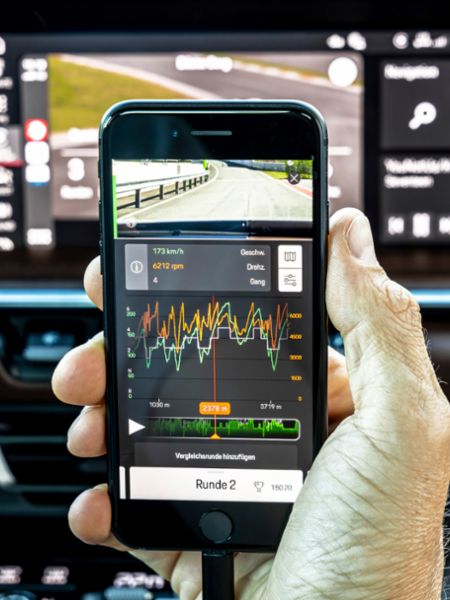Kickoff: Official start of regular production in headquarter plant Ultra-modern flagship: New Insignia with especially efficient powertrains and innovative assistance systems Guest of honour: Opel CEO Lohscheller welcomes Mayor Udo Bausch to the plant Rüsselsheim. Production of Opel’s new flagship has officially started. With Rüsselsheim’s Mayor Udo Bausch and Opel CEO Michael Lohscheller in attendance,… Continue reading @Groupe PSA: PR Start of Production: New Opel Insignia Drives off Rüsselsheim Production Line000250
Tag: Apple
German Handelsblatt: Car manufacturer: Daimler defends itself against judgment in patent dispute with Sharp000283
Daimler Daimler is of the opinion that the use of patents cannot be denied if its suppliers pay for a corresponding license. (Photo: obs) Tokyo, Stuttgart Daimler has to defend itself again against the allegation of patent infringement. The Japanese Apple supplier Sharp announced on Friday that the Munich Regional Court had ruled that the… Continue reading German Handelsblatt: Car manufacturer: Daimler defends itself against judgment in patent dispute with Sharp000283
@VW Group: Analyse this: the Porsche Track Precision App
The Porsche Track Precision App enables drivers to record videos, lap times and car data in one place, for detailed analysis and sharing. Keen to try it out, we joined Porsche’s Sport Auto Perfection Training 2020 at the Nürburgring Nordschleife so we could discover if, like the Porsche Offroad Precision App, it would see us… Continue reading @VW Group: Analyse this: the Porsche Track Precision App
@Ford: This Time It’s Personal: Now Your Car Learns What You Like – Tech Suggests When to Call Your Mum or Hit the Gym
Debuting in the all-electric Mustang Mach-E, Ford’s next-gen SYNC system keeps drivers in control with large touchscreens, intuitive design, conversational speech recognition Ford SYNC communication and entertainment system employs machine-learning to offer new levels of personalisation – learns from driver behaviours to make smart suggestions New Remote Vehicle Setup feature enables owners to pre-configure new… Continue reading @Ford: This Time It’s Personal: Now Your Car Learns What You Like – Tech Suggests When to Call Your Mum or Hit the Gym
@Groupe PSA: PR Extra Efficient Engines: New Opel Mokka Combines Fun and Modernity000169
Advanced diesel and petrol engines: innovations for city traffic and the open road Leading the way: new Mokka introduces future Opel brand face and digital cockpit Distinct looks: GS Line trim adds sporty touch Bright road ahead: IntelliLux LED® matrix light and LED lamps Typically Opel: excellent seating with full leather and driver massage options… Continue reading @Groupe PSA: PR Extra Efficient Engines: New Opel Mokka Combines Fun and Modernity000169
@VW Group: Finishing touches for many details: The Audi Q2 in new top form
The principle of polygons: the exterior designThe Audi Q2 is a robust all-rounder for everyday use and leisure whose character is reflected in its body line: They are sporty, elongated, and powerful at the same time, and the corners and edges give the compact SUV a confident appearance. As a result of its revision, the… Continue reading @VW Group: Finishing touches for many details: The Audi Q2 in new top form
@Toyota: Toyota Land Cruiser Powers up for Autumn with new Engine and Equipment Features
New 2.8-litre engine with stop and start, giving both more power and efficiency for Land Cruiser and Land Cruiser Commercial models Four-cylinder turbodiesel unit produces 201bhp and 500Nm of torque 0-62mph acceleration cut to less than 10 seconds* Multimedia upgrade with Apple CarPlay/Android Auto smartphone integration as standard on all models Extension of Toyota Safety… Continue reading @Toyota: Toyota Land Cruiser Powers up for Autumn with new Engine and Equipment Features
Soriano Motori: The Next Generation of EV Motorcycles
Electric mobility is expanding at a rapid pace. The years 2017 and 2018 have, however, been very noteworthy for the EV market. In 2017 was a landmark year for EVs as global sales surpassed one million units for the first time. Studies, including a prominent one by Deloitte estimate that year 2022 will be a… Continue reading Soriano Motori: The Next Generation of EV Motorcycles
@FCA: 2021 Jeep® Gladiator Fact Sheet
September 1, 2020 , Auburn Hills, Mich. – The 2021 Jeep® Gladiator, engineered from the ground up to be the most off-road capable Jeep truck ever, builds on a rich heritage of tough, dependable trucks with an unmatched combination of rugged utility, authentic Jeep design, open-air freedom, clever functionality and versatility. Powertrain options include a 3.6-liter… Continue reading @FCA: 2021 Jeep® Gladiator Fact Sheet
Ike Announces First Fleets in Automated Trucking Customer Program
SAN FRANCISCO, Sept. 1, 2020 /PRNewswire/ — Ike, a developer of automated trucking technology (also referred to as “self-driving” or “autonomous” trucking), today announced its “Powered by Ike” customer program, including partnerships with leading logistics companies Ryder System, Inc. (NYSE: R), DHL, and NFI. These industry-leading fleets will be among the first to deploy “level… Continue reading Ike Announces First Fleets in Automated Trucking Customer Program
